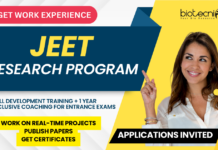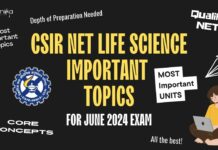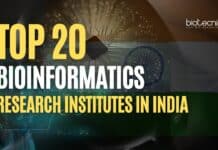RGCB MSc JRF Job Opening – Online Application Process
RGCB MSc JRF Job Opening – Online Application Process. Rajiv Gandhi Centre for Biotechnology Job. JRF RGCB job. Interested and eligible applicants can check out all of the details on the same below –
If you are wondering how the interview questions will be for the role of Junior Research Fellow at RGCB, then make sure you check out all of the questions at the bottom of the page.
This job expires in
#Adv. # 18/2023
Applications are invited from suitable candidates for one position of Junior Research Fellow in a ICMR funded research project entitled “Epigenetic regulation of trophoblast stem cells involved in women reproductive health and disease: an observational and functional study” in the Laboratory of Dr. Debasree Dutta at Rajiv Gandhi Centre for Biotechnology, Thiruvananthapuram.
Name of the Post – Junior Research Fellow
No. of Posts – 01
Name of the PI – Dr. Debasree Dutta
Age – Below 28 years as on June 15, 2023. Age relaxation will be given as per Govt. of India norms.
Duration – Initially for a period of one year and extendable for three years or till termination of the project whichever is earlier based on performance evaluation on yearly basis.
Selection Process & Instructions –
- Applications should be submitted online.
- Candidates who are currently working in Government firms should send applications through proper channels.
- The last date for receiving completed applications is June 15, 2023.
- If a candidate wishes to apply for different positions, separate applications should be submitted for each position. Selection of the position will not entitle the candidate to any future positions at RGCB (permanent or otherwise). As with all project positions at RGCB, the position will be co-terminus with the end of the project.
Applications which are not in the prescribed format will summarily be rejected.
Only those fulfilling the above criteria need to apply. Applicants will be shortlisted for the ONLINE selection interview based on eligibility criteria. Selection of suitable candidates will be made based on qualifications and performance in the selection interview.
Essential Qualifications –
- The candidate must have good academic records with first class Master’s Degree in any branch of Science
- Post MSc minimum 06 months of experience in mouse/human embryology, mammalian cell culture (preferably on trophoblast or embryonic stem cells), cell biology techniques including FACS, fluorescence microscopy, molecular biology techniques including Western blot, PCR, RNA/DNA isolation, Experience letter should be duly endorsed by the authority.
Emoluments – ₹31,000/- + 18% HRA per month for MSc degree holders who have qualified NET/GATE (with valid certificate).
Are you looking for some possible interview questions for the role of Junior Research Fellow at RGCB, then read below
- Can you explain the objective and significance of the research project “Epigenetic regulation of trophoblast stem cells involved in women reproductive health and disease: an observational and functional study”?
- The objective of the project is to investigate the epigenetic mechanisms underlying the regulation of trophoblast stem cells in the context of women’s reproductive health and disease. By understanding the epigenetic changes that occur in these cells, we aim to gain insights into the development and progression of reproductive disorders and identify potential therapeutic targets.
- What relevant experience do you have in mouse/human embryology and mammalian cell culture, particularly with trophoblast or embryonic stem cells? Can you provide examples of techniques and experiments you have conducted in these areas?
- I have a minimum of six months of experience in mouse/human embryology and mammalian cell culture, specifically working with trophoblast or embryonic stem cells. During this time, I have successfully cultured and maintained these cells, conducted experiments involving FACS analysis, fluorescence microscopy, and molecular biology techniques such as Western blotting, PCR, and RNA/DNA isolation. For example, I have performed gene expression analysis in trophoblast cells using quantitative PCR and validated protein expression through Western blotting.
- How do you plan to contribute to the research project? Can you outline your approach or ideas for addressing the objectives of the study?
- As a Junior Research Fellow, I intend to contribute by utilizing my strong background in molecular biology and cell culture techniques to investigate the epigenetic regulation of trophoblast stem cells. I will collaborate with the research team to design and perform experiments aimed at understanding the epigenetic modifications in these cells. Additionally, I will apply advanced techniques such as chromatin immunoprecipitation (ChIP) assays or DNA methylation analysis to unravel the epigenetic landscape of trophoblast cells and its implications for reproductive health and disease.
- How have you ensured accuracy and reliability in your previous laboratory work, especially when performing FACS analysis, fluorescence microscopy, and molecular biology techniques?
- To ensure accuracy and reliability in my laboratory work, I have always followed stringent protocols and quality control measures. When performing FACS analysis, I maintained proper instrument calibration, used appropriate gating strategies, and performed appropriate controls to ensure accurate identification and quantification of cell populations. In fluorescence microscopy, I carefully optimized imaging parameters, selected appropriate fluorophores, and acquired images using consistent exposure times. For molecular biology techniques, I implemented rigorous experimental controls, validated reagent concentrations, and performed replicates to ensure reproducibility and reliability of results.
- Have you encountered any challenges or limitations in your previous research experiences related to the epigenetic regulation of stem cells? How did you address or overcome those challenges?
- During my previous research experiences, I encountered challenges related to the analysis and interpretation of epigenetic data, as well as the optimization of experimental protocols for studying stem cell epigenetics. To overcome these challenges, I engaged in comprehensive literature review, sought guidance from senior researchers, and attended relevant workshops or conferences to gain additional insights. I also collaborated with experts in the field to refine my techniques and ensure the validity and robustness of my experimental approaches.
Remember, these answers are provided as examples, and it’s important to personalize them based on your own experiences and knowledge.
Editor’s Note: RGCB MSc JRF Job Opening – Online Application Process. Please ensure that you are subscribed to the Biotecnika Times Newsletter and our YouTube channel to be notified of the latest in the industry. Follow us on our social media like Twitter, Telegram, Facebook








































